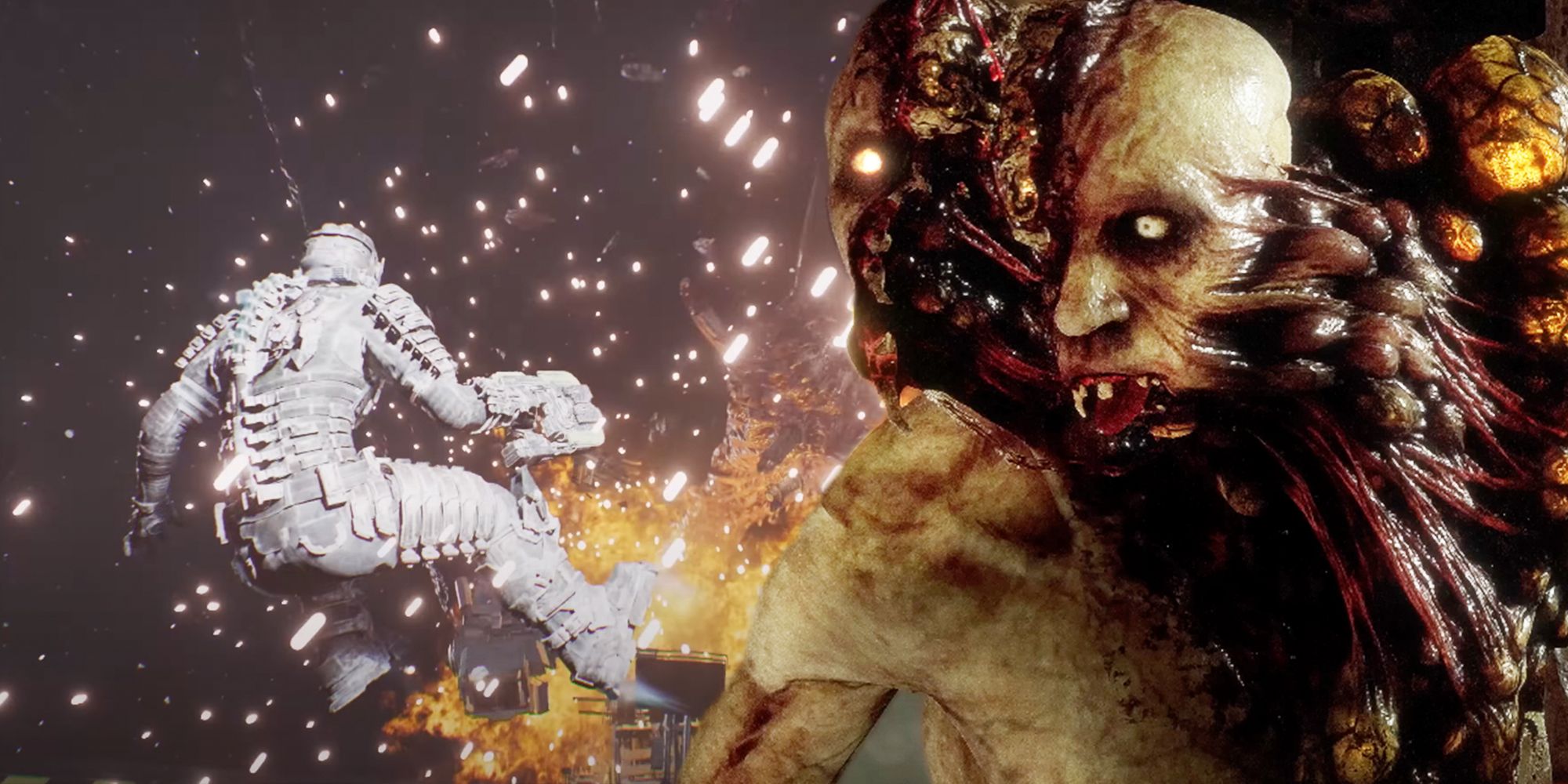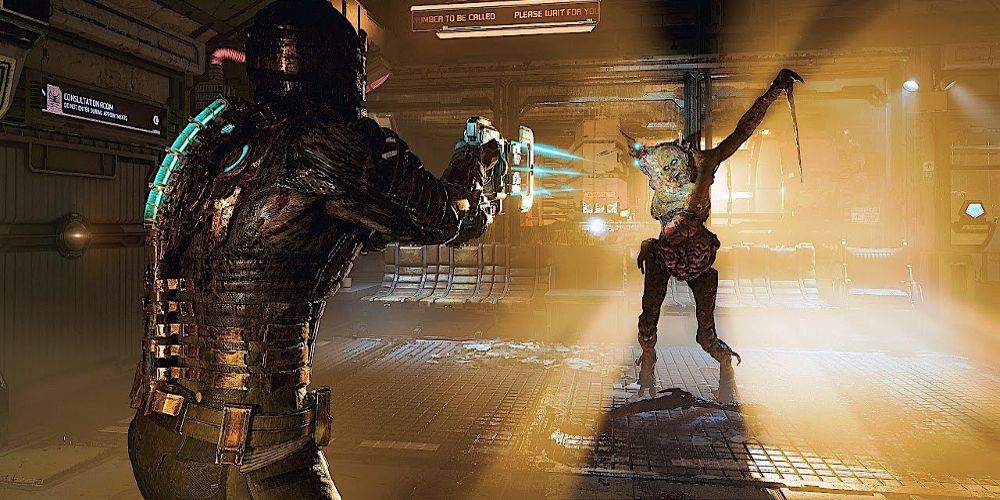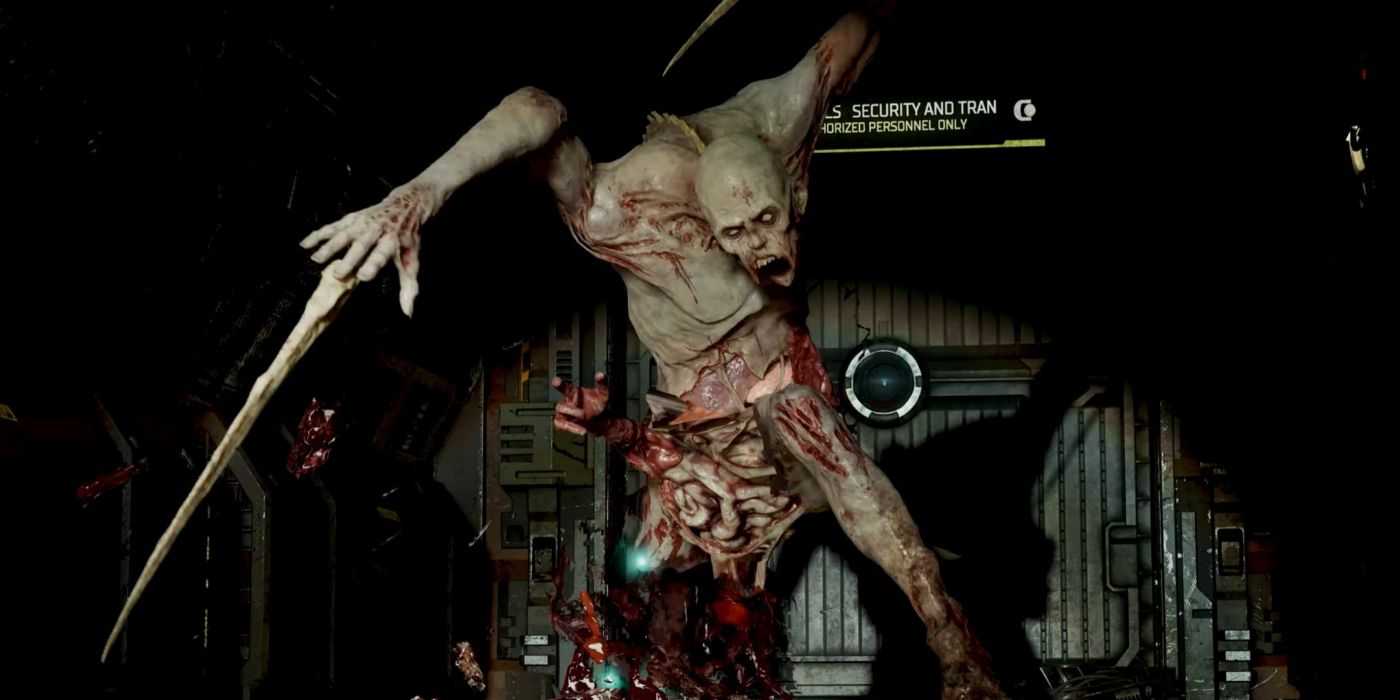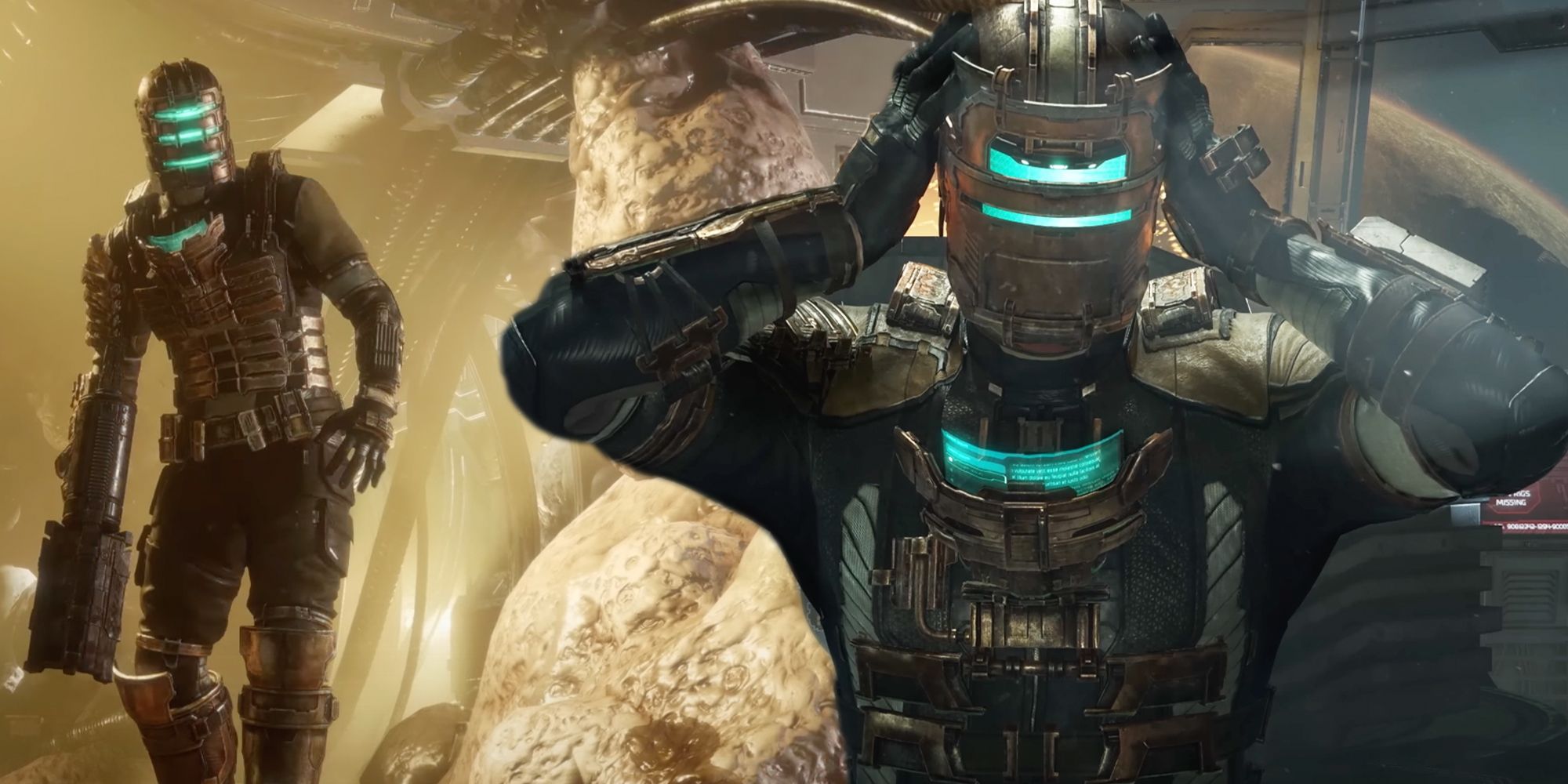EA's Dead Space remake is set to take players back through the USG Ishimura for another round of adrenaline-fueled gameplay. The first Dead Space game released in 2008, and spawned two direct sequels: 2011's Dead Space 2 and 2013's Dead Space 3. A decade later, the first game has been remade in the Frostbite engine, and features gameplay improvements inspired by mechanics developed in the sequels.
While this new Dead Space is said to remain essentially the same as the first in terms of plot, developers have stated that the personality and life of Isaac, the game's protagonist, will be fleshed out to a greater degree. Isaac's story is not the only aspect of the game that will be augmented, however, as Dead Space features a healthy portion of new music written by film and television Trevor Gureckis. While the Dead Space remake will still feature the music of original composer Jason Graves, Gureckis—who is a frequent collaborator of M. Night Shyamalan and has written music for Servant and Old—has contributed thrilling new music to the game that will surely help immerse players even further into the frightening happenings onboard the USG Ishimura.
Trevor Gureckis spoke with Screen Rant about the lore of Dead Space, the instrumentation he used for his score, and more.
Trevor Gureckis on Dead Space
Screen Rant: Do you play all those instruments I see behind you?
Trevor Gureckis: I kind of do. It's varying degrees of playing. They call it, like, a "composer violinist" or a "composer cellist". I do a lot of scores for thriller, horror, that kind of thing, [where] there's lots of stuff you can do, and you don't have to be a trained violinist. I went to school for classical piano, so I can actually play the piano. I dabble in playing strings, but if I need someone to play a melody or a scale, I have to hire someone.
Did you play a lot of your music for Dead Space?
Trevor Gureckis: There is a lot of solo stuff in it, but we recorded a huge orchestra. We did three big sessions at Ocean Way in Nashville with an amazing orchestra. It must have been a seventy [or] eighty piece group, with fifty strings, and full brass, and winds, and then choir. It started around April 2021, and then every four months I'd go out with a bunch of music to record.
I saw a quote where you said it took eighteen months to do this. That's so much longer than a film or TV score takes.
Trevor Gureckis: Yeah, I'm working on a TV show right now. I just started, and it's going to be done in a few months. This is my first game project ever, so I don't know what the typical process is, and I'm sure there are many different situations. You can be in situations as a composer where you're rushed, or where you do have a lot of time, and in this case I did.
I was working with a really great audio and music team at Motive and EA. They really wanted to take a step back and evaluate what they had, and [the] possibilities. "What are the possibilities for this remake, sonically, [and] narratively? What are the connections that they are going to put together?" That was my task. "Where are we going to draw some new connections across narrative points across the game as a whole? What's the feeling of something that changes over time as the player as Isaac progresses in the game?"
Also, [we were] bringing in a new look at the Dead Space lore and being like, "Okay, what is the sound of Unitology? What is the sound of the marker?" and taking the time to have a big picture of that. With the first score, Jason Graves' score, he establishes a great sound, and that DNA is there. I wanted to be very careful about being true to fitting naturally in there, so it feels comfortable when [you're] playing it - [that] you're not feeling like you're playing a different game. At the same time, [my goal was] adding some kind of new definition or intimacy where there are close, emotional moments.
Jason Graves' music is still in the game, right? You're filling out other areas?
Trevor Gureckis: I didn't do the actual implementation music in the game. Just like everyone else, I've seen the first eighteen minutes that have been released. They wanted to keep the original opening, and that sort of thing, but things definitely start to change. [There's] a new Hunter experience, a whole new ending, [and] the cutscenes are new, I think. The zero-g music is all new, and then there are story arcs and side elements with Nicole that were explored in this version that they didn't have music for.
You said you hadn't done a game before, and you had to step into a universe where there is music and a soundscape already established. What was the most challenging thing about this for you?
Trevor Goreckis: Finding the pocket that felt right for everyone. They wanted to make sure that there's something that felt new, and also in the world that is familiar. I was super upfront and clear about it myself, because I played the game in 2008. I'm fan of it, and a fan of the score, so I didn't want to have a bump where you were playing it, and then suddenly you'd feel like, "Oh, man, this is so new, and such a different vibe, and I'm not vibing with this."
It's more like an exploration of some of the ideas that were in the original. There is a ton of new stuff, and we found ourselves going deeper into it, and I actually ended up writing more than I thought I was going to, but still the point was to make it cohesive and feel natural. There are so many elements of the game that they were working on; the developers were trying to amp up all these new ways of storytelling within the game itself, and I was sort of taking part in that.
For instance, this idea of corruption that happens as you get closer, and further, and further. I did a number of pieces that involve music that gets to the idea of the corrupted mind. I don't know if you've played the original, but you start to go insane, seeing people and that kind of stuff. [I worked to] musically represent that in some way. That was an exciting idea to explore.
You mentioned you weren't involved in the implementation of the music. As someone who is new to composing for games, how do you structure a cue when you don't have a scripted scene to line it up to?
Trevor Gureckis: Sometimes I'd get rough captures, [where] someone would piece together mo-cap and storyboard and put it together into this little thing that's sort of like, "This is the cutscene that leads into some gameplay," and you get an idea about where it's going to go. [However,] there's always an off-ramp of where the player might go, and run off, and do their own thing and decide to somewhat loop around. We have to prepare for that situation, where the music has some liveability within it.
At the same time, I write a lot of music that's pretty dense; it has kind of a maximalism quality to it. Ultimately, I get these long stretches - for the biggest battle scene, I think altogether it came out to be maybe nine minutes long - but in various points, there are transitional points that are set up to be looped. I don't do that, I just know that it has the ability to do it. I planned it so that we could do it, then we just recorded them like they were straight cues all the way through, and then provided a lot of stems. The music editors who were involved in piecing the game together were able to take [an] element and reconstruct it how they needed using the game's audio engine.
Once you recorded the orchestra and the choir, did you then augment those performances with synths and electronic elements as well?
Trevor Gureckis: Yeah. I have a lot of synths. I sort of always have a hybrid orchestra vibe. I even sometimes work with my orchestrator to have the orchestra imitate the electronics, which is a cool melding of the two. I'll make a synth patch, [or a] crazy line, or something, and then he'll come up with the woodwinds doing something that kind of sounds like that, and we'll mix it together or decide how we want to work it out in the mix later. A lot of these decisions are made at the very, very, very end, but really, [we're trying to] take as much material in as possible. Then, we decide how to clean it up and make it how I envisioned it. The soundtrack album was not all the music that I've written for the game, but it's sort of a "best of", I guess. There are plenty of cues that are not on there, but it's the representation of the full orchestra in terms of all the elements playing at the same time.
Screen Rant did a premiere of "The Hive Mind" from your soundtrack. It's eight minutes long, and it has so many builds, and so much great percussion stuff. Could you speak to the process of creating that cue?
Trevor Gureckis: "The Hive Mind" is essentially the final boss cue. It's pretty wild; it's the craziest track I've ever written. [Behind me] is the cello that I'm, like, wailing on. There are crazy riffs that I'm doing, and putting that through a Distressor, and effects to make it really sound like a screaming animal.
Process-wise, it starts out kind of like what I was describing in terms of what I was getting - a little bit of cutscene, leading to gameplay, leading to cutscene, and then gameplay. They gave me essentially like a scene from a film - someone who just took an early shot. The [enemies], I think, were like squares - you know what I mean? That kind of rendering. But I got the idea, and I had seen and played the hive mind from the original.
[My goal was] getting the bumps of intensity going in a stepwise manner. It's this one large run to the end of the game; that was the concept of it. There's definitely the gameplay music where there's the groove of fighting, but then it changes and goes to the next thing, and it's like the next level, then the next thing, then the next level. Then there's a crazier thing, like you're flipping around upside down, and all this stuff. It's unreal. I can't even imagine what it looks like, because I haven't even seen it.
With the drums, we had five taiko drums, and I augmented that with samples for extra power as well. There is lots of percussion, and just me banging, and playing my cello, and we had the orchestra doubling my cello sometimes. That was often what happened - I would play stuff on my solo instruments and then pick out places where the whole orchestra would play with me, in this dramatic cello concerto moment. Then, there's a screaming choir that's yelling. The intensity level is definitely up there. I'm curious how they mixed it all together. The track itself is just so intense, and then I can't imagine [what it's like] with sound design and stuff. I'm kind of like, "Well, good luck."
It blew my mind a little. It's eight minutes, it starts off high-energy, and it still builds the whole time.
Trevor Gureckis: We even did a Shepard tone; we made Shepard tones. A Shepard tone is an electronic music technique where everything's moving up tonally, including the low instruments, but they just fade out and start going to the bottom, so there's a feeling of constantly going up. It's a vertigo, almost.
About Dead Space
Dead Space puts players in the boots of Isaac Clarke, an everyman engineer on a routine mission to fix a gigantic mining starship, the USG Ishimura. But aboard the Ishimura, a living nightmare awaits. The ship’s crew has been slaughtered and infected, and Isaac’s girlfriend, Nicole, is missing somewhere on board. Alone and trapped, with only his engineering tools and skills, Isaac faces a battle for survival - not only against terrifying monsters called Necromorphs, but his own crumbling sanity.
For more, check out our interview with Dead Space creators Roman Campos-Oriola & Mike Yazijian
Dead Space launches on January 27th on Xbox Series X|S, PlayStation 5, and PC. Dead Space (Original Soundtrack) will be available the same day on digital platforms, courtesy of Lakeshore Records and EA music.




